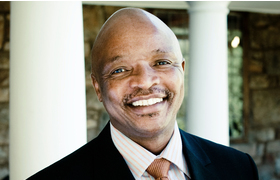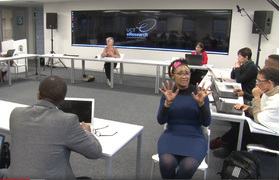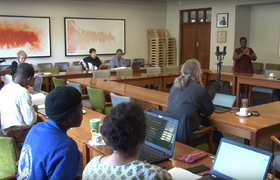Report back on the first IRTC Steering Committee meeting
27 January 2017 | Sipho Pityana
Mr Sipho Pityana, Chair of the IRTC Steering Committee (and Chair of UCT Council), gives a report back on the first meeting of the committee.
Dear staff and students
Members of the University of Cape Town Special Executive Task Team signed an agreement with student formations on 6 November 2016. (Read the agreement...). The parties expressed a commitment to establishing a multi-stakeholder steering committee to oversee the proposed Institutional Reconciliation and Transformation Commission (IRTC) and other processes covered by the agreement.
This commitment reflects a recognition of the importance of shaping the restorative process in an inclusive way to maximise participation in, and support for, the outcomes of the IRTC. The University Council subsequently endorsed both the proposal of an IRTC and the composition of the steering committee that would oversee the IRTC. It should also be recognised that the university places a great amount of confidence in the steering committee to develop and guide a process that will ultimately address issues of great complexity. The first meeting of the IRTC steering committee was held on 26 January 2017. The manner in which the meeting was conducted and concluded not only reflected the commitment of the UCT community to address these challenging matters, but also our ability to reach consensus on difficult issues in the spirit of robust debate and dialogue.
The purpose of the initial meeting was to determine the following processes: operational procedures for the steering committee, provisional terms of reference for the IRTC, the criteria for selection of commissioners and a provisional timeframe for the work of the IRTC. Twelve out of 13 constituencies were represented in the first meeting of the steering committee, which I chaired: the Student Representative Council, Shackville TRC, other student formations, Deans, Heads of Departments, Senate, Executive Directors, the Black Academic Caucus, alumni, the PASS Forum, the Employees Union, the Academics Union and the National Education Health and Allied Workers Union. Trade unions with whom UCT has concluded an agreement on organisational rights were invited, but were not represented in the first meeting.
The following points were agreed by the meeting:
1. Operational procedures
- To ensure continuity, both the representative and the alternate member of each constituency may attend all meetings with full participation rights.
- Decisions will be made through a process of consensus. However, the meeting recognised that some decisions will have to revert to the respective constituencies for consultation.
- In the interest of transparency, information will be disseminated in the following ways:
- Future steering committee meetings will be live-streamed, but the committee may determine by agreement that certain discussions (e.g. relating to the privacy of specific individuals) will require that discussions be conducted without live-streaming.
- The Chair of the steering committee or Deputy Vice-Chancellor for Transformation will issue a campus-wide statement after every meeting.
- A secretariat will organise and capture the minutes of the meeting. The minutes will be sent out to all steering committee members for approval.
2. Provisional terms of reference for the IRTC
Provisional terms of reference are clustered into two broad areas, as per the agreement of 6 November 2016:
- Cluster one. In terms of this cluster the commission will:
- Consider all Shackville-related protests of 2016, including disciplinary procedures and interdicts; and
- Invite submissions from all constituencies on clemencies that were granted and whether clemency should be turned into amnesty; and make recommendations on how the university should deal with pending cases and other such matters in future.
- Cluster two. In terms of this cluster the commission will:
- Make recommendations on institutional culture, transformation, decolonisation, discrimination, identity, disability and any other matters that the university community has raised over the past 18 months, or may wish to raise.
- The details of the discussion on the time frame for the IRTC, the terms of reference and the criteria for selecting commissioners are being written up and will be circulated to the steering committee in the next week and will then be shared with the university community.
3. Framework for selecting commissioners
The committee decided on a maximum of five commissioners. Three will constitute a quorum. Each constituency may nominate up to five commissioners. The steering committee will consider the nominations and make a recommendation to Council to appoint the commissioners. The call for nominations for commissioners, together with the agreed criteria for commissioners, will be sent out to the university community in February and again when students have registered in March. Nominations will close on 17 March 2017. Members of the university community will be asked to send their nominations, accompanied by a motivation, to their respective representatives on the steering committee. A portal will be set up to receive nominations.
Yours sincerelyMr Sipho M Pityana
Chair of the IRTC steering committee (and Chair of UCT Council)
 This work is licensed under a Creative Commons Attribution-NoDerivatives 4.0 International License.
This work is licensed under a Creative Commons Attribution-NoDerivatives 4.0 International License.
Please view the republishing articles page for more information.









